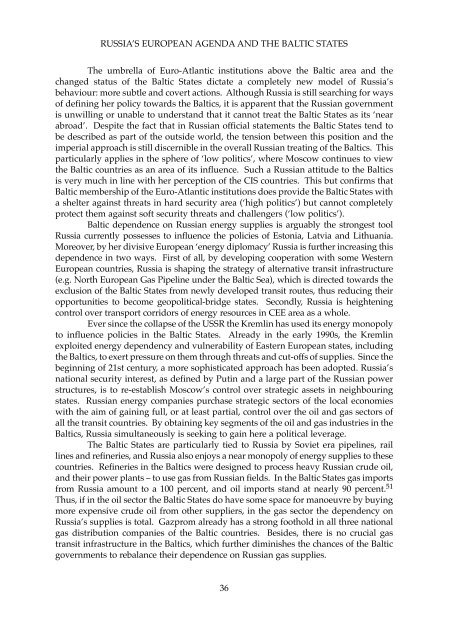Russia's European Agenda and The Baltic States - Defence ...
Russia's European Agenda and The Baltic States - Defence ...
Russia's European Agenda and The Baltic States - Defence ...
Create successful ePaper yourself
Turn your PDF publications into a flip-book with our unique Google optimized e-Paper software.
RUSSIA’S EUROPEAN AGENDA AND THE BALTIC STATES<br />
<strong>The</strong> umbrella of Euro-Atlantic institutions above the <strong>Baltic</strong> area <strong>and</strong> the<br />
changed status of the <strong>Baltic</strong> <strong>States</strong> dictate a completely new model of Russia’s<br />
behaviour: more subtle <strong>and</strong> covert actions. Although Russia is still searching for ways<br />
of defining her policy towards the <strong>Baltic</strong>s, it is apparent that the Russian government<br />
is unwilling or unable to underst<strong>and</strong> that it cannot treat the <strong>Baltic</strong> <strong>States</strong> as its ‘near<br />
abroad’. Despite the fact that in Russian official statements the <strong>Baltic</strong> <strong>States</strong> tend to<br />
be described as part of the outside world, the tension between this position <strong>and</strong> the<br />
imperial approach is still discernible in the overall Russian treating of the <strong>Baltic</strong>s. This<br />
particularly applies in the sphere of ‘low politics’, where Moscow continues to view<br />
the <strong>Baltic</strong> countries as an area of its influence. Such a Russian attitude to the <strong>Baltic</strong>s<br />
is very much in line with her perception of the CIS countries. This but confirms that<br />
<strong>Baltic</strong> membership of the Euro-Atlantic institutions does provide the <strong>Baltic</strong> <strong>States</strong> with<br />
a shelter against threats in hard security area (‘high politics’) but cannot completely<br />
protect them against soft security threats <strong>and</strong> challengers (‘low politics’).<br />
<strong>Baltic</strong> dependence on Russian energy supplies is arguably the strongest tool<br />
Russia currently possesses to influence the policies of Estonia, Latvia <strong>and</strong> Lithuania.<br />
Moreover, by her divisive <strong>European</strong> ‘energy diplomacy’ Russia is further increasing this<br />
dependence in two ways. First of all, by developing cooperation with some Western<br />
<strong>European</strong> countries, Russia is shaping the strategy of alternative transit infrastructure<br />
(e.g. North <strong>European</strong> Gas Pipeline under the <strong>Baltic</strong> Sea), which is directed towards the<br />
exclusion of the <strong>Baltic</strong> <strong>States</strong> from newly developed transit routes, thus reducing their<br />
opportunities to become geopolitical-bridge states. Secondly, Russia is heightening<br />
control over transport corridors of energy resources in CEE area as a whole.<br />
Ever since the collapse of the USSR the Kremlin has used its energy monopoly<br />
to influence policies in the <strong>Baltic</strong> <strong>States</strong>. Already in the early 1990s, the Kremlin<br />
exploited energy dependency <strong>and</strong> vulnerability of Eastern <strong>European</strong> states, including<br />
the <strong>Baltic</strong>s, to exert pressure on them through threats <strong>and</strong> cut-offs of supplies. Since the<br />
beginning of 21st century, a more sophisticated approach has been adopted. Russia’s<br />
national security interest, as defined by Putin <strong>and</strong> a large part of the Russian power<br />
structures, is to re-establish Moscow’s control over strategic assets in neighbouring<br />
states. Russian energy companies purchase strategic sectors of the local economies<br />
with the aim of gaining full, or at least partial, control over the oil <strong>and</strong> gas sectors of<br />
all the transit countries. By obtaining key segments of the oil <strong>and</strong> gas industries in the<br />
<strong>Baltic</strong>s, Russia simultaneously is seeking to gain here a political leverage.<br />
<strong>The</strong> <strong>Baltic</strong> <strong>States</strong> are particularly tied to Russia by Soviet era pipelines, rail<br />
lines <strong>and</strong> refineries, <strong>and</strong> Russia also enjoys a near monopoly of energy supplies to these<br />
countries. Refineries in the <strong>Baltic</strong>s were designed to process heavy Russian crude oil,<br />
<strong>and</strong> their power plants – to use gas from Russian fields. In the <strong>Baltic</strong> <strong>States</strong> gas imports<br />
from Russia amount to a 100 percent, <strong>and</strong> oil imports st<strong>and</strong> at nearly 90 percent. 51<br />
Thus, if in the oil sector the <strong>Baltic</strong> <strong>States</strong> do have some space for manoeuvre by buying<br />
more expensive crude oil from other suppliers, in the gas sector the dependency on<br />
Russia’s supplies is total. Gazprom already has a strong foothold in all three national<br />
gas distribution companies of the <strong>Baltic</strong> countries. Besides, there is no crucial gas<br />
transit infrastructure in the <strong>Baltic</strong>s, which further diminishes the chances of the <strong>Baltic</strong><br />
governments to rebalance their dependence on Russian gas supplies.<br />
36

















